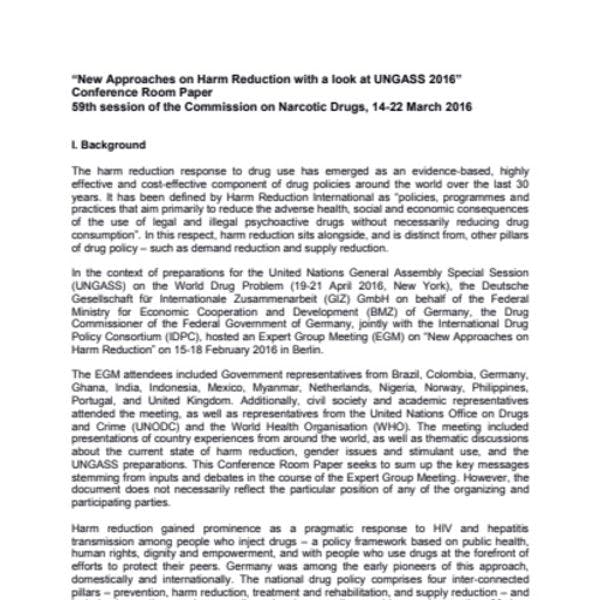« Nouvelles approches sur la réduction des risques pour l’UNGASS de 2016 » Document de séance, réunion d’un groupe d’experts sur la réduction des risques
Ce rapport traite des principales questions relatives aux mesures de réduction des risques, en perspective de l'UNGASS qui se tiendra en Avril prochain. Pour en savoir plus, en anglais, veuillez lire les informations ci-dessous.
Abonnez-vous à l'Alerte mensuelle de l'IDPC pour recevoir des informations relatives à la politique des drogues.
“New Approaches on Harm Reduction with a look at UNGASS 2016” Conference Room Paper, 59th session of the Commission on Narcotic Drugs, 14-22 March 2016
The harm reduction response to drug use has emerged as an evidence-based, highly effective and cost-effective component of drug policies around the world over the last 30 years. It has been defined by Harm Reduction International as “policies, programmes and practices that aim primarily to reduce the adverse health, social and economic consequences of the use of legal and illegal psychoactive drugs without necessarily reducing drug consumption”. In this respect, harm reduction sits alongside, and is distinct from, other pillars of drug policy – such as demand reduction and supply reduction.
In the context of preparations for the United Nations General Assembly Special Session (UNGASS) on the World Drug Problem (19-21 April 2016, New York), the Deutsche Gesellschaft für Internationale Zusammenarbeit (GIZ) GmbH on behalf of the Federal Ministry for Economic Cooperation and Development (BMZ) of Germany, the Drug Commissioner of the Federal Government of Germany, jointly with the International Drug Policy Consortium (IDPC), hosted an Expert Group Meeting (EGM) on “New Approaches on Harm Reduction” on 15-18 February 2016 in Berlin.
Keep up-to-date with drug policy developments by subscribing to the IDPC Monthly Alert.
